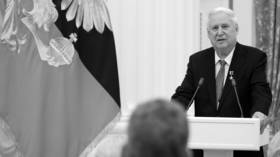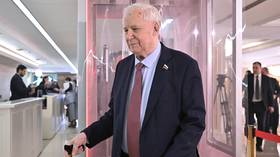
The 94-year-old politician had resigned his parliamentary position last September

FILE PHOTO: Nikolay Ryzhkov during a ceremony in 2019, at which he received the Hero of Labor of the Russian Federation state award. © Sputnik / Mikhail Klimentyev
Soviet statesman Nikolay Ryzhkov has died aged 94, less than five months after resigning from the upper chamber of the Russian parliament.
He was a senior cabinet member of the USSR in its final decade, who was tasked with tackling the 1986 Chernobyl nuclear plant disaster. He sought to reform the nation’s failing economic system with Mikhail Gorbachev, and strongly opposed Boris Yeltsin’s leadership. In modern Russia, he represented Belgorod Region in parliament.
The news of Ryzhkov’s passing was announced on Wednesday by Valentina Matvienko, the chair of the Federation Council. The top senator hailed her former colleague as an exemplary “working man” in the sense that he was highly dedicated to every job he took on.
”With his labor he earned honor, respect and, I am certain of that, a dignified place in history,” she wrote on social media. Having worked side by side with Ryzhkov for a long time, Matvienko said his death was a shock for her.
Ryzhkov resigned from his position in the Federation Council in late September 2023. He told journalists that he had realized it was the proper thing to do at his age.

Read more
He had represented his constituency in the upper chamber since 2003, and had previously been elected to the State Duma, the lower chamber.
Ryzhkov’s career started in the 1950s, when he was a worker at a metal plant in the Urals and rose through the ranks to become factory director. In the 1970s, he was promoted to the USSR cabinet as a deputy to the minister of heavy industry.
In 1985, he became the chairman of the Soviet government. His response to the Chernobyl fallout the following year was credited for mitigating its worst consequences.
The statesman was a supporter of Gorbachev’s perestroika reforms. Ryzhkov believed that the USSR could gradually introduce market elements into its economy. He opposed Yeltsin’s push for a radical transition and ran against him for the presidency of Soviet Russia in 1991, finishing in second place.
He was also a senior member of the Communist Party and its leadership body, the Politburo. Before his death, Ryzhkov was the second-oldest living member of the formerly powerful council, after Vadim Medvedev.




